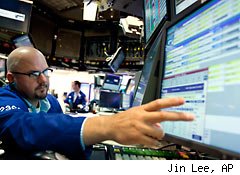 So much for Irene. Stock indexes rose sharply Monday after it became clear that the tropical storm caused far less damage than many had feared.
So much for Irene. Stock indexes rose sharply Monday after it became clear that the tropical storm caused far less damage than many had feared.
Stocks rose broadly, led by insurers. The Dow Jones industrial average gained more than 230 points in afternoon trading.
Consulting firm Kinetic Analysis Corp. predicted that the claims paid by insurers would be about $2 billion to $3 billion, far less than the $6 billion the industry paid out after Hurricane Isabel struck the region in 2003.
The lower damage estimates pushed insurance stocks higher. Allstate Corp. rose 7.4 percent, Hartford Financial Services Group Inc. rose 12.4 percent, while Travelers Cos. Inc. rose 4.3 percent. Insurance and banking stocks in the Standard & Poor’s 500 rose 3.3 percent, the most of the 10 company groups that make up the index.
Utilities companies also rose after it became clear their storm-related expenses would be lower than earlier estimates. Duke Energy Corp., which serves customers in the Carolinas, rose 1.3 percent. New York’s biggest utility company, Consolidated Edison Inc., also rose 1.3 percent.
The New York Stock Exchange and other major U.S. exchanges opened as usual Monday after making extensive preparations over the weekend. At the NYSE, executives brought in dozens of cots so employees could sleep there to be ready for the opening bell.
The Dow Jones industrial average rose 232 points, or 2.1 percent, to 11,515 in afternoon trading. It is now down just 0.5 percent for the year. It had been down as much as 7 percent for the year on Aug. 10.
The Standard & Poor’s 500 index rose 29, or 2.4 percent, to 1,205. The widely used market benchmark has now gained back all of the ground it lost since it hit a 2011 low on Aug. 8, after Standard & Poor’s downgraded the U.S. government’s credit rating. Since then, it has risen 7.7 percent.
adsonar_placementId=1505951;adsonar_pid=1990767;adsonar_ps=-1;adsonar_zw=242;adsonar_zh=252;adsonar_jv=’ads.tw.adsonar.com’;
The Nasdaq composite index rose 70, or 2.8 percent, to 2,550.
The Russell 2000 index, a benchmark for small companies, rose 26 points, or 3.8 percent, to 718. That suggested investors were more willing to take on risk. Small-company stocks are more likely to fall in economic downturns, but they also offer the potential of larger gains if the economy does well. The Russell is still down 8.3 percent this year, twice as much as the S&P 500.
European stocks jumped after two Greek banks said they would combine to better weather that country’s debt crisis.
Greek stocks rose 14 percent after the country’s second- and third-largest lenders agreed to combine, creating the country’s largest bank. Greece’s government and central bank have been urging banks to merge, saying it would help them survive the country’s debt crisis.
Stocks worldwide plunged in late July and early August, in part because of worries about Europe’s escalating debt problems. Greece has narrowly avoided bankruptcy twice thanks to emergency loans from the International Monetary Fund and other European countries.
Bank of America Corp. rose 7.8 percent, the most of the 30 stocks that make up the Dow average, after the bank said it would sell half of its stake in China Construction Bank Corp. The bank has been selling assets to raise cash to comply with new banking regulations.
Last week billionaire Warren Buffett’s company Berkshire Hathaway Inc. said it would invest $5 billion in the bank, giving the troubled company a badly needed boost of confidence. The nation’s largest bank has lost 35 percent of its value over the past year as investors worry that its liabilities from soured mortgages will get worse and that it will have to sell large amounts of stock to raise capital.
An increase in consumer spending also helped push stocks higher. The government reported that spending rose 0.8 percent in July. It was a sharp turnaround from June, when Americans spent less for the first time in nearly two years.
Volume was low as transit disruptions made it difficult for Wall Street employees to get to work. Flooding and downed trees obstructed tracks throughout the commuter rail systems that bring workers in from the Connecticut, New York and New Jersey suburbs.
Many investment banks that have offices in Lower Manhattan said they would operate as usual, even if employees had to work from home or find alternative ways to get to the office. Goldman Sachs Group Inc. and Citigroup Inc. both said their buildings were largely unaffected by the storm.
Ted Weisberg, a trader who has spent 43 years on the floor of the New York Stock Exchange, said “it really will be business as usual.”
Many traders were on vacation in the last week of summer before the Labor Day holiday.
Get info on stocks mentioned in this article:
ALL
ED
HIG
TRV
Manage Your Portfolio
Copyright 2011 The Associated Press. All rights reserved. This material may not be published, broadcast, rewritten or redistributed.


Leave a Reply